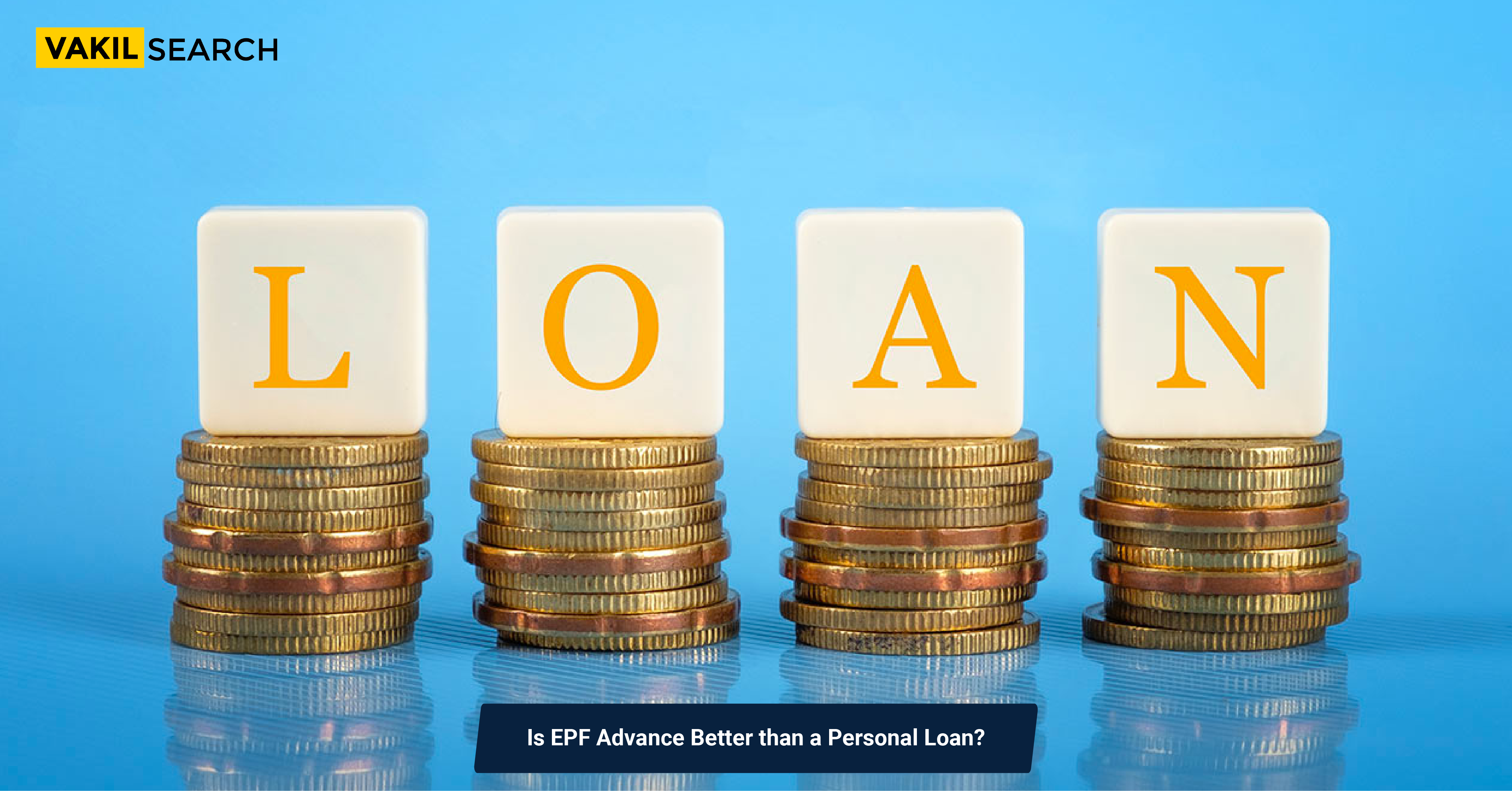This article compares EPF advance and personal loans, helping you decide which suits your financial needs.
In times of financial need, individuals often find themselves at a crossroads: should they tap into their Employees’ Provident Fund (EPF) advance or opt for a personal loan? Both options have their merits and demerits, and making the right choice can significantly impact your financial well-being. Know about EPF Advance Vs Personal Loan!
In this article, we will delve into the nuances of EPF advance and personal loans, offering a comprehensive comparison to help you make an informed decision. Additionally, we will introduce you to Vakilsearch’s ITR (Income Tax Return) services, designed to simplify your tax filing process and ensure financial stability.
Understanding EPF Advance
Before we compare EPF advances and personal loans, let’s break down what an EPF advance entails:
The EPF advance is a facility offered to EPF account holders by the Employees’ Provident Fund Organization (EPFO). It allows individuals to withdraw a portion of their accumulated EPF balance for specific purposes, such as medical emergencies, home loans, education, or marriage.
Here are the key features of an EPF advance:
Eligibility: EPF advance eligibility criteria vary depending on the purpose of withdrawal. However, the general rule is that you should have a minimum of five years of continuous service.
Interest Rate: Since an EPF loan is a premature withdrawal, it does not have to be repaid, unlike a PPF (Public Provident Fund) loan. As a result, there is no interest rate. The cost of this loan is calculated as the amount of interest you could have earned on the amount withdrawn if you had not made the withdrawal.
Repayment: EPF advances are not repayable. Instead, the withdrawn amount is deducted from your EPF account balance, impacting your future retirement corpus.
Understanding Personal Loans
On the other hand, personal loans are unsecured loans provided by banks and financial institutions. They offer borrowers the flexibility to use the funds for any purpose, including medical expenses, debt consolidation, travel, or even home renovation. Here are the key features of personal loans:
Eligibility: Personal loan eligibility is determined by your creditworthiness, income, and other factors. It is not limited by the length of your employment.
Interest Rate: Personal loan interest rates can vary widely, depending on the lender and your credit score. They tend to be higher than EPF advance interest rates.
Repayment: Personal loans require regular repayments, typically in monthly installments, over a specified loan tenure.
EPF Advance vs. Personal Loan: A Comparative Analysis
Now, let’s compare the two options based on various factors:
- Interest Rates:
EPF advance taking into the loss of interest earning capacity on the corpus employed generally offers lower interest rates compared to personal loans. This makes EPF withdrawal a more cost-effective option.
- Eligibility:
EPF advance eligibility depends on your years of service and the specific purpose of withdrawal. Personal loans depend on your creditworthiness and income, making them accessible to a broader range of individuals.
- Repayment:
EPF advances do not require repayment, but the withdrawn amount affects your retirement corpus. Personal loans require regular repayments, which can be a burden if you’re facing financial challenges.
- Purpose:
EPF advance is designed for specific purposes like medical emergencies or home loans. Personal loans offer flexibility to use the funds for any purpose.
Vakilsearch’s ITR Services: Secure Your Financial Future
While you weigh the pros and cons of EPF advances and personal loans, it’s crucial to keep your financial matters in order. Vakilsearch offers ITR services that simplify the income tax return filing process. Our team of experts ensures accurate and hassle-free tax returns, helping you stay compliant with tax laws and regulations.
With Vakilsearch’s ITR services, you can:
- Maximize tax deductions and exemptions
- Avoid penalties and errors in your tax returns
- Stay informed about changing tax laws
- Experience a smooth and stress-free tax filing process
The Takeaway
In conclusion, choosing between an EPF advance and a personal loan depends on your financial situation and the purpose of the funds. While EPF advance offers lower interest rates and is suitable for specific needs, personal loans provide flexibility but come with higher interest costs.
As you make this important decision, remember to explore Vakilsearch’s ITR services. Ensure your financial stability and future security, by connecting with our experts right away!
FAQs on EPF Advance Vs Personal Loan
Can I withdraw my entire EPF balance as an advance?
No, you can only withdraw a specific portion of your EPF balance for approved purposes. The remaining balance continues to accrue interest for your retirement.
Is it advisable to use EPF advance for non-emergency purposes like travel or education?
EPF advance is intended for genuine emergencies or specific financial needs. It's not recommended for financing discretionary expenses.
How does my credit score affect my personal loan interest rate?
Your credit score plays a significant role in determining the interest rate for a personal loan. A higher credit score often leads to lower interest rates.

